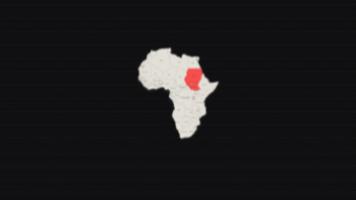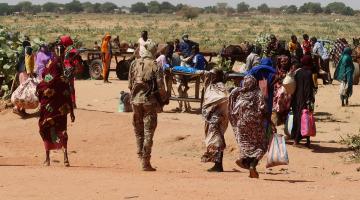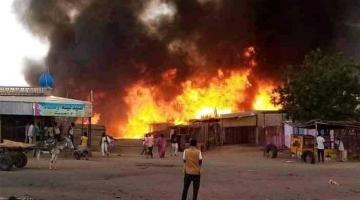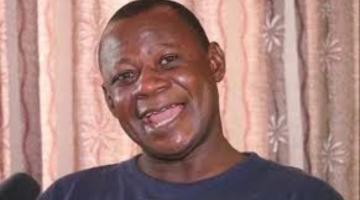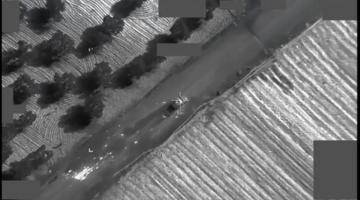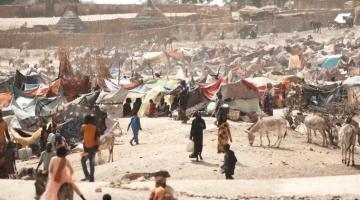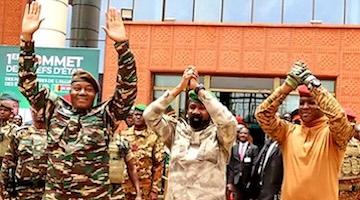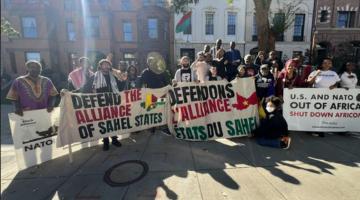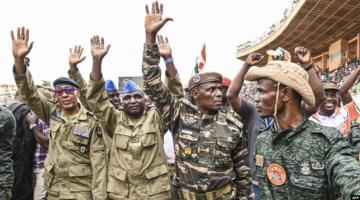SEAL commandos evacuated US embassy staff from Khartoum, Sudan. (Photo: Reuters)
The United States deploys naval warships and drones after creating the conditions for destabilization in Sudan. AFRICOM's presence is expanding under the guise of protecting US nationals.
Originally published in Internationalist 360°.
Since April 15 hundreds of thousands of people have been dislocated in the Republic of Sudan, a strategically important state and a member of the African Union (AU).
The two military structures which have dominated the body politic for many years have now turned against each other leaving the country in an unprecedented social crisis.
Reports from inside Sudan indicate that over 500 people have been killed in the fighting between the Sudanese Armed Forces (SAF) and the Rapid Support Forces (RSF). Thousands of others have been wounded, seriously injured and traumatized as their homes have been damaged along with the loss of jobs, the diminishing healthcare services and the disruption of communities within Khartoum, Omdurman and other areas throughout the vast country.
Such a chaotic situation can only benefit the imperialist states which have sought to dominate Sudan and the African continent for centuries. The United States has imposed harsh sanctions on the Republic of Sudan for decades accusing the former government of President Omer Hassan al-Bashir of being a sponsor of state terrorism.
Successive administrations in Washington encouraged the rebellion in the South of the country, which resulted in the partitioning and subsequent weakening economically and politically of the newly formed Republic of South Sudan as well as Khartoum in the North. Since the split of the Republic of Sudan the economic crisis in both states have worsened precipitously.
During December 2018 when mass demonstrations erupted due to the rise in prices for food and fuel, the focus of the protests rapidly shifted to the demand for the resignation of longtime President Omer Hassan al-Bashir. After four months of unrest involving broad segments of the Sudanese population, the military overthrew the National Congress Party (NCP) administration headed by al-Bashir in April 2019. The leader was detained in an effort to calm the anger of the masses inside this resource-rich state which is the third largest geographically on the African continent.
Nonetheless, the leading organizations in the democratic struggle including the Sudanese Professional Association (SPA) and the Forces for Freedom and Change (FFC) were not satisfied that the head-of-state had been removed by his own military from which he emerged during the seizure of power in 1989. The people involved in the demonstrations, strikes and rebellions in 2019 wanted a new civilian administration in the capital of Khartoum.
The actions of the military in April 2019 were clearly designed to preempt a genuine revolutionary transformation of Sudanese society. Two months after the removal of al-Bashir from office, the people continued to engage in mass demonstrations including an occupation outside the Defense headquarters in Khartoum.
In order to clear people from the streets, the security forces including the combined structures of the RSF, police and SAF were involved in the massacre of untold numbers of civilians in June 2019. Immediately the international community including the AU intervened diplomatically in an effort to prevent further instability and deaths. A series of negotiations were initiated which brought together various political interests within Sudan in an effort to contain the internal contradictions inside the country.
The existing military structures were able to establish dialogue with the armed opposition groups in the western Darfur region and the areas of Blue Nile and Kordofan where fighting was still taking place. The Juba Peace Agreement represented a milestone in efforts to build a united Sudan. Although all of the affiliates of the Sudanese Revolutionary Front (RSF) which encompasses these armed groupings were not united in regard to their views on a future dispensation, they had committed themselves to a political process involving negotiations.
Nonetheless, the role of the U.S. under the previous administration of President Donald Trump and the current White House led by President Joe Biden has been largely responsible for the failure to reach a broad consensus among the myriad of Sudanese organizations. The Biden administration in the recent period continued to recognize the military led by Abdel Fattah al-Burhan and Mohamed Hamdan Dagalo (Hemitti) as the only entities of authority responsible for a democratic transition. This recognition of the military as an indispensable component of the political process only emboldened Generals Hemitti and al-Burhan.
White House Orders Warship and Drones to the Red Sea
The Biden administration has provided a confusing and contradictory message in regard to the situation in Sudan. Initially, there was the evacuation of U.S. diplomatic personnel from the capital of Khartoum during the first few days of the clashes between the SAF and RSF.
The State Department said that it had no plans for the evacuation of the 16,000 people holding U.S. passports in Sudan. Administration officials noted that they had warned U.S. citizens to leave the country as early as the middle of 2021.
Nevertheless, since the withdrawal of diplomatic staff, there has been a military build-up in the Port Sudan area in the east of the country. The U.S., Britain, France and other states are participating in the evacuation of their citizens from Sudan.
According to one source on the movement of U.S. military forces in the Red Sea:
“The Pentagon has assisted the evacuation by deploying intelligence and surveillance support, ‘and we are moving naval assets within the region to provide any necessary support along the coast,’ according to a statement on Saturday (April 29) from Deputy Pentagon Press Secretary Sabrina Singh. A U.S. official told NPR American ships are just off Port Sudan, but not in the port itself. The official said there are no State Department or U.S. military personnel at the Port.”
In another report from the Military Times, it explains the extent of Pentagon presence by the U.S. Africa Command (AFRICOM) in the Red Sea area. Obviously, the escalating tensions in Sudan will influence the talking points of the Biden administration in regard to the deepening militarization of the Red Sea and Horn of Africa regions of the continent.
The Military Times emphasizes:
“Current support includes intelligence, surveillance and reconnaissance capabilities to observe potential land routes out of Sudan and detect threats, and positioning naval assets off the coast of Sudan should they be needed,’ Air Force Brig. Gen. Pat Ryder, a Pentagon spokesman, told reporters during a briefing, as well as a deconfliction cell at U.S. Africa Command headquarters in Germany to help coordinate efforts with allied countries also evacuating their citizens. The destroyer Truxtun is off the coast of Sudan, Ryder said, while the expeditionary mobile base Lewis B. Puller is en route, both of which can provide transport of evacuees. Surveillance assets include unmanned aerial vehicles, he added. Roughly 100 troops in three MH-47 Chinook helicopters moved 70 remaining embassy personnel out on Saturday night, the Associated Press reported to an undisclosed location in Ethiopia. Roughly 100 troops in three MH-47 Chinook helicopters moved 70 remaining embassy personnel out on Saturday night, the Associated Press reported to an undisclosed location in Ethiopia. Defense Secretary Lloyd Austin ‘continues to convene daily meetings with AFRICOM joint staff and other key DoD officials on the situation in Sudan and is committed to the department to fully support State Department’s ongoing efforts,’ Ryder said.”
The U.S. government and ruling class do not want a revolutionary democratic government in the Republic of Sudan since the impact of such a phenomenon would have residual effects throughout the North and Horn of Africa region. To the north of Sudan, it is quite discernible in relations to Egypt that the imperialists do not want an end to the status quo where the military forces are subsidized by the U.S. in exchange for illusive commitments of financial support through loans and trade deals.
Under the guise of protecting U.S. nationals and maintaining a security presence against terrorist attacks, the AFRICOM forces are enhancing their deployment in the Red Sea area. Antiwar activists in the West should be as concerned as the neighboring states such as South Sudan about foreign military interventions.
South Sudanese President Salva Kiir has offered to host a meeting between the two belligerent military structures in order to work out a permanent ceasefire. Kiir has warned that any outside military intervention will only aggravate the existing internal problems.
Until African states and regional organizations such as the AU, the Inter-governmental Authority on Development (IGAD) and East Africa Community insist upon the non-interference in the internal affairs of Sudan and any other African state, imperialism will continue to strive to control developments among the 1.3 million people on the continent.
Abayomi Azikiwe is the editor of Pan-African News Wire, an international electronic press service designed to foster intelligent discussion on the affairs of African people throughout the continent and the world. The press agency was founded in January of 1998 and has published thousands of articles and dispatches in newspapers, magazines, journals, research reports, blogs and websites throughout the world. The PANW represents the only daily international news source on pan-African and global affairs.

